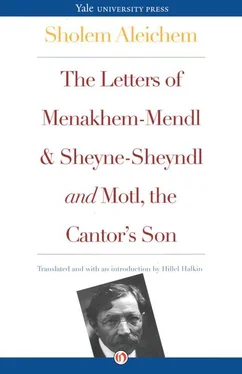There’s nothing Elye can’t make. Don’t let Pinye tell you otherwise. He keeps teasing Elye that the only good thing about his seideh is that it’s cold. Apart from that, Pinye says, it’s for the birds. “If it’s for the birds,” Elye says, “how come you drink it all day?” “What’s it to you what I drink?” Pinye answers. “How much can one person drink? If I drank it from morning to night, it still wouldn’t come to a nikl’s worth.”
That’s when Brokheh butts in. A nikl, she says, is money too. So of course Taybl has to stick up for her husband. Pinye, she says, is a full partner in the biznis and can be allowed a nikl’s worth of seideh. It’s a good thing my mother was there and said: “Why, I wouldn’t touch that seideh if you paid me! It looks like bread kvass and tastes like death!”
We all laughed so hard that we stopped quarreling.
Biznis was even better when the vawdehmehln season began. We cut the mehlehnz into slices and sold them for a pehni a slice. If the mehln was a good one, we made a nice profit and had enough left over for supper. You have to finish a vawdehmehln the day you open it because the next morning it’s nothing but red frizz. Mendl, Pinye, and I prayed every day that the kahstemehz would leave some for us.
Some items have a sizn. As soon as summer was over, the seideh and vawdehmehln disappeared. Others sell all year round, like sigahs and sigehrehts. We kept up a good biznis in them.
There are all kinds of sigehrehts. Some are one for a pehni and some are two. Mendl, Pinye, and I sometimes cop a few toofehz. Who has to know?
In America it’s called smawkink. Once I was smawkink a toofeh with Mendl, a puff for him and a puff for me. It would have been fine if God hadn’t created Brokheh. She smelled the smoke and ratted to Elye, who gave me a smawkink I’d rather forget. It wasn’t so much the smawkink that upset him as its being Saturday. It seems that if Peysi the cantor’s son is caught smawkink on the Sabbath, you’re allowed to beat him to death. Even my mother agreed that this time the dog deserved the stick. That’s why I gave up smawkink. I can’t even stand the smell any more.
Our stend also sells peypehz, Jewish dailies and magazines. We don’t make much on them but it gives Pinye something to read. Once his nose is in a peypeh, that’s it. Noospeypehz affect him like magnets, he says. He’d like to write for the peypehz himself. He’s even been up to Ist Brawdvey, where they’re printed. He won’t tell us what he did there. I sure hope he didn’t bring them his poems.
I’ll bet he did, though, because whenever a new batch of peypehz arrives, Pinye grabs them and goes through them with a fine tooth comb. His hands actually shake. After a while he jumps up and rushes off to Ist Brawdvey. “What’s on Ist Brawdvey?” Elye asks. “Biznis,” Pinye tells him. “I thought our biznis was here,” Elye says. “You call this a biznis?” Pinye says. “Seven people eating their way through one stend — some biznis!” “Where do you get seven?” Elye asks. Pinye counts them on his fingers. He and Taybl are two. Elye and Brokheh are four. My mother is five. And the two little men — that’s me and Mendl — make seven.
That upset my mother. Mendl and me, she said, make our living fair and square. We deliver the peypehz to our kahstemehz before the stend opens in the morning and help out after skul. (I’ve forgotten to tell you we go to skul now.) She gave it to Pinye, my mother did.
Half of what she says is in American by now. She just gets everything backwards. Instead of cooking a tshikn in the kitshn, she cooks the kitshn in a tshikn. But she laughs at herself along with everyone. “ Abi ir veyst az bei mir a tshikn iz a kitshn un a kitshn iz a tshikn, vahts deh difrins?” she asks.
You tell me. What language is that?
Early one morning my friend Mendl and I were delivering the peypehz to our kahstemehz when there was a clap on my back and someone said:
“Hallaw, homeboy!”
I turn around — it’s Big Motl, the same boy who hung around with us in Cracow, Lemberg, Vienna, and Antwerp. I’ve told you how he taught me to give a governor and be a ventriloquist. He left for America before us and was already doing awreit in New York while we were still pounding the streets of Vaytshepl. That is, he found a dzhahb at a klinnehz.
“What kind of a dzhahb is that?” I asked as we walked.
Big Motl explained that a klinnehz cleaned clothes. You took a pair of creased pants, stuck them into a machine built like a flat oven, shut the lid, pulled a lever — and out came the pants as good as new.
“And what’s your dzhahb?” Big Motl asked.
“Dehlivehrink noospeypehz,” I said. “We bring them to our kahstemehz before skul. And after skul we voik in the biznis. We have a kawneh stend and make a living.”
“Hey!” said Big Motl. “You speak pretty good English. How much do you two biznismen make?”
“About a dahleh a week,” I say. “Sometimes a dahleh-and-akvawdeh.”
“Dats awl?” boasts Big Motl. “I make three dahlehz a week. So what’s this dzhentlminz neym?”
I said it was Mendl. Motl laughed and said, “Yuck!” “So what should it be?” I asked. Motl thought and said that Mendl should call himself Meik. That sounded a lot better. “What do you go by?” I asked. “Meks,” says Motl. “Since I’m a Motl too,” I say, “I guess I should also be Meks.” “Yaw Meks awredi,” he says. When he left us he said: “Si yuh suhn, Meks! Si yuh, Meik!”
We agreed to meet on Sunday and go to the moofink pikshehz. We swapped addresses and went our separate ways.
After Sunday dinneh Meik and I went to the moofink pikshehz to see Tshahli Tsheplin. Elye and Pinye came too. Tshahli Tsheplin was all Pinye could talk about: what a stah he was, and how much money he made, and how he was even a Jew. But Pinye and Elye never agree. Tshahli Tsheplin, Elye said, was not such a big deal. “I suppose you think anyone can make a thousand dahlehz a week,” Pinye said. “How do you know what Tshahli Tsheplin makes?” asked Elye. “Have you counted his money?” Pinye said he read it in the peypehz. “And how do you know he’s a Jew?” asked Elye. That, Pinye said, was in the peypehz too. “And how do the peypehz know?” Elye asked. “I suppose they were at his circumcision.” “The peypehz,” Pinye said, “know everything. How else would we know that Tshahli Tsheplin’s a deaf mute, and can’t read or write, and has a drunk for a father, and was a circus clown?” “Suppose it’s all a big fat lie?” asked Elye, cool as a cucumber. That got Pinye sore. “For a Jew yourself,” he said, “you’re one big pain in the neck.” Pinye’s right. Elye may be my brother, but he sure is a pain.
We had just arrived at the tikkit vindeh when we heard someone say:
“Hah duh yuh doo, Meks? Hah duh yuh doo, Meik?”
It was Big Motl. I mean Big Meks.
“Don’t buy any tikkits,” Big Meks said. “I’m trittink today.”
He slipped half a dahleh through the vindeh and asked the tikkit girl for three tikkits in the belkehni.
“Who’s this character?” Elye wanted to know.
I told him. Elye looked Big Meks up and down and asked why he didn’t introduce himself. “I suppose you’re too much of an American to speak Jewish,” he said.
Big Meks didn’t answer. But from the entrance came a voice that said:
“Joik!”
We all turned to look. There was no one there. Pinye and Elye scanned the lahbi. They looked at the ceiling and stared at each other. Who could it be? Big Meks took me and Mendl by the hand and the three of us went ahpstaihz. On the way he told us it was ventriloquism. He even did it for us again. Mendl and I laughed so hard that we were rolling in the aisles even before Tshahli Tsheplin’s act began.
Читать дальше












